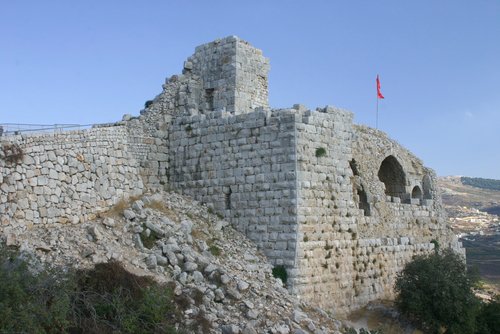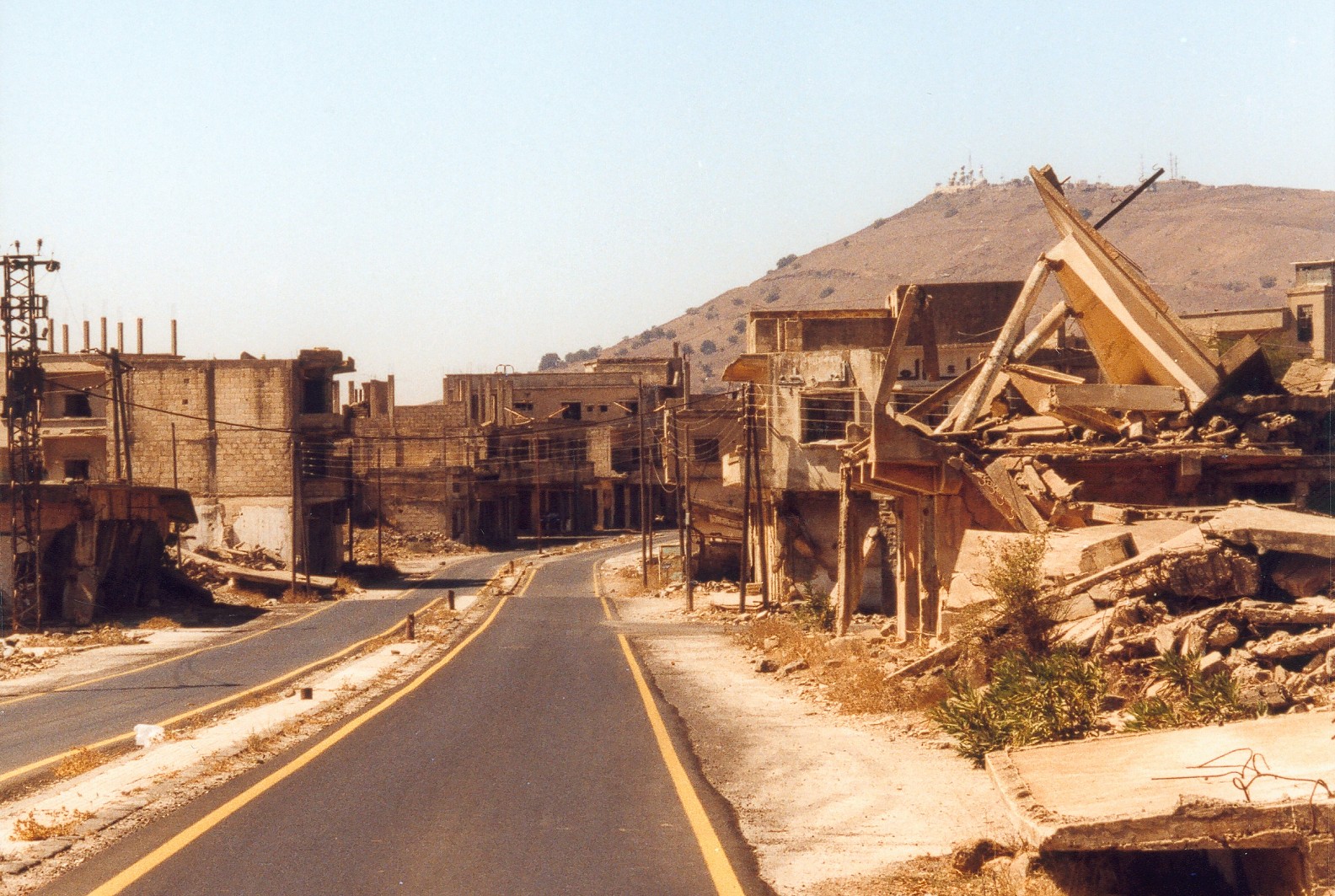
Most of the Golan Heights has been under Israeli control since the 1967 war. In many ways this scenic corner of southwestern Syria mirrors, in less extreme terms, the Nackba of 1948. After the takeover tens of thousands of Druze and Circassian residents became refugees in circumstances that remain controversial. Today Israel refuses to allow an estimated 100,000 Druze and Circassian displaced by the conflict to return home. Every week separated families meet with loudspeakers at the cease fire line, it is the only way they have been able to regularly see each other for the last forty years.
Israeli families who live on either side of the Israeli-Syrian border have no such problems. Almost immediately after taking control Israeli settlers, with the encouragement of their government, began colonizing the area. By the 1970's twelve Israeli settlements, illegal under international law which prohibits the transfer of a civilian population to occupied territory, had perched themselves among the hills of the Heights. In 1981 Israel effectively annexed the area with legislation transferring control of the Heights from military control to its Northern District, in a move condemned with only one negative vote by the U.N General Assembly. By 2004 nearly 20,000 Israeli settlers inhabited over thirty settlements, with plans for future migrants in the works.

On a human scale the story of the Golan Heights is similar to the story of the Nackba, but on a strategic level it is entirely different. The Golan was settled for a variety of reasons. Economic settlers pursued rich agricultural land, "[t]hey didn't even try to hide their greed for that land" reported former defense minister Moshe Dayan as he recounted the reasons and the methods for the seizure. The ultra-nationalist religious zealots will naturally support any expansionist policy, even, and especially, at the expense of security, and the Israeli government wants leverage over Syria.
Israeli families who live on either side of the Israeli-Syrian border have no such problems. Almost immediately after taking control Israeli settlers, with the encouragement of their government, began colonizing the area. By the 1970's twelve Israeli settlements, illegal under international law which prohibits the transfer of a civilian population to occupied territory, had perched themselves among the hills of the Heights. In 1981 Israel effectively annexed the area with legislation transferring control of the Heights from military control to its Northern District, in a move condemned with only one negative vote by the U.N General Assembly. By 2004 nearly 20,000 Israeli settlers inhabited over thirty settlements, with plans for future migrants in the works.

On a human scale the story of the Golan Heights is similar to the story of the Nackba, but on a strategic level it is entirely different. The Golan was settled for a variety of reasons. Economic settlers pursued rich agricultural land, "[t]hey didn't even try to hide their greed for that land" reported former defense minister Moshe Dayan as he recounted the reasons and the methods for the seizure. The ultra-nationalist religious zealots will naturally support any expansionist policy, even, and especially, at the expense of security, and the Israeli government wants leverage over Syria.
It is true, the Likuid movement is adamant it will never withdraw from Golan, but this has more to do with domestic politicking then any serious commitment. Naturally Israel appreciates control of the water resources emanating from the Heights as well as their military value, but Golan is more valuable to Israeli policymakers as a bargaining chip, here the settlement project in the Golan Heights more closely resembles that in the Sinai than that in the West Bank.
The return of the Golan Heights to Syria will take place within the framework of a peace agreement between Israel and Syria, indeed it will be the basis of a peace agreement between Israel and Syria. By achieving a separate peace with Syria Israel will ply the Alawite-ruled republic from the Iranian orbit, weaken the Palestinian negotiation position, and likely gain concessions regarding Hezbollah, certainly at a minimum disrupt the Iranian supply links to the Lebanese group that serves as the main deterrent against both an attack on Iran and further military adventurism in Lebanon.
But undermining Hezbollah and Iran is a secondary, albeit important issue. Israel recognizes that the principal leverage the Palestinian bring to the negotiating table is the promise of normalizations of relation with surrounding Arab states and full integration into the region. The Palestinians have offered the Saudi Peace Initiative of 2002, endorsed by every Arab state (and almost every other state in the world), as the basis for negotiations. Under the plan Israel would be integrated into the region, the Arab-Israeli Conflict would officially end, and a Palestinian state would be created along the internationally recognized, pre-June 1967 borders.
Eventually Israel will be forced to reach some sort of settlement with its neighbors, but they want that settlement to include as much land as possible. By reaching a separate peace with the Syrians the Israelis will remove a significant regional power, much like they did by reaching a peace deal with Egypt, from the equation and substantially weaken the negotiating positions of the Palestinians. That is much more valuable to the Israelis than a small chunk of Syrian land, and for Syrian President Bashir al-Assad control of the Golan is much more valuable than some abstract devotion to the Palestinian cause.





5 comments:
Remember the conditions which led Israel to liberate the Golan Heights. For decades, the Syrians, from thier superior position, would fire shells and snipe at kibbutzim and towns around the Kinneret. Many people in kibbutzim were forced to sleep in bomb shelters. Some attacks were even carried out by Yasser Arafat, may his name be accursed, who was allowed by the Syrians to use this territory for support.
fter the Six-Day War began, the Syrian air force attempted to bomb oil refineries in Haifa. While Israel was fighting in the Sinai and West Bank, Syrian artillery bombarded Israeli forces in the eastern Galilee, and armored units fired on villages in the Hula Valley below the Golan Heights. On June 9, 1967, Israel moved against Syrian forces on the Golan. By late afternoon, June 10, Israel was in complete control of the plateau. Israel's seizure of the strategic heights occurred only after 19 years of provocation from Syria, and after unsuccessful efforts to get the international community to act against the aggressors. Israel liberated the Golan Heights in a defensive war, after being attacked by Syria. There is no law that demands that the victim return land to a defeated aggressor.
It is ridiculous to suggest that the Golan Heights is naturally part of Syria, as opposed to Israel. Syria was created in 1947, and controlled the Golan until 1967. Israel has controlled the Golan for double that period, for 42 years. Therefore, there is no reason to say that the Golan is Syrian, as opposed to Israeli. If you would visit the Golan (and I have) you would be able to see Jewish communities and synagogues dating back 2000 years ago. It was the center of Jewish life in Israel after the Destruction of the Second Temple. Jewish life goes back even further in the Golan, being the inheritance of half of the biblical tribe of Menashe. Jews are no strangers to the Golan, and the people living there are not "colonists" but people coming home after a long absence. Just so you are aware, international law prohibits transferring a population to an occupied territory, like Germans to the Sudetenland, or Chinese to Tibet. However, the Jews living in the Golan do so voluntarily, which is completely legal.
The Golan is crucial to Israel's security. From the western Golan, it is only about 60 miles — without major terrain obstacles — to Haifa and Acre, Israel's industrial heartland. The Golan — rising from 400 to 1700 feet in the western section bordering on pre 1967 Israel — overlooks the Hula Valley, Israel's richest agricultural area. In the hands of a friendly neighbor, the escarpment has little military importance. If controlled by a hostile country, however, the Golan has the potential to again become a strategic nightmare for Israel. efore the Six-Day War, when Israeli agricultural settlements in the Galilee came under fire from the Golan, Israel's options for countering the Syrian attacks were constrained by the geography of the Heights. "Counterbattery fires were limited by the lack of observation from the Huleh Valley; air attacks were degraded by well-dug-in Syrian positions with strong overhead cover, and a ground attack against the positions...would require major forces with the attendant risks of heavy casualties and severe political repercussions," U.S. Army Col. (Ret.) Irving Heymont observed. When Israel eventually took these risks and stormed the Syrian positions in 1967, it suffered 115 dead — roughly the number of Americans killed during Operation Desert Storm.
Again, more anti-Israel nonsense. Full of rhetoric, but short on facts.
"Look, it's possible to talk in terms of 'the Syrians are bastards, you have to get them, and this is the right time,' and other such talk, but that is not policy, You don't strike at the enemy because he is a bastard, but because he threatens you. And the Syrians, on the fourth day of the war, were not a threat to us. After all, I know how at least 80 percent of the clashes there started. In my opinion, more than 80 percent, but let's talk about 80 percent. It went this way: We would send a tractor to plow some area where it wasn't possible to do anything, in the demilitarized area, and knew in advance that the Syrians would start to shoot. If they didn't shoot, we would tell the tractor to advance farther, until in the end the Syrians would get annoyed and shoot. And then we would use artillery and later the air force also, and that's how it was. The kibbutzim there saw land that was good for agriculture, And you must remember, this was a time in which agricultural land was considered the most important and valuable thing. Of course they wanted the Syrians to get out of their face. They suffered a lot because of the Syrians. Look, as I said before, they were sitting in the kibbutzim and they worked the land and had kids and lived there and wanted to live there. The Syrians across from them were soldiers who fired at them, and of course they didn't like it. But I can tell you with absolute confidence, the delegation that came to persuade Eshkol to take the heights was not thinking of these things. They were thinking about the heights' land. Listen, I'm a farmer, too. After all, I'm from Nahalal, not from Tel Aviv, and I know about it. I saw them, and I spoke to them. They didn't even try to hide their greed for that land."
Moshe Dayan
What is the source of this comment? Dayan says how the Syrians would fire and threaten kibbutzim and Israeli homes. Every Israeli security expert today agrees that the Golan Heights is essential to Israel's security.
http://www.nytimes.com/1997/05/11/world/general-s-words-shed-a-new-light-on-the-golan.html?pagewanted=1
Treaty are holding for along the partied involved still agreed to honored, but sometimes the people make last through Showing their will. Golan heights are part of Israel! !
Post a Comment